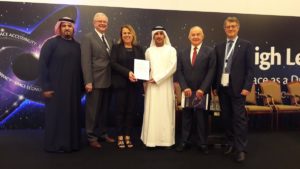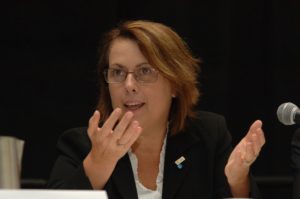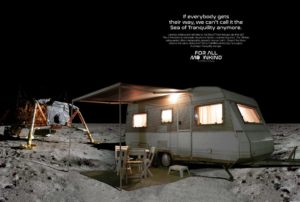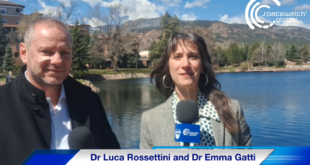Prior to this year’s High Level Forum in Dubai, SpaceWatch Middle East spoke with Simonetta di Pippo, Director of the United Nations Office for Outer Space Affairs (UNOOSA), about this year’s HLF forecast.
We are heading towards the 2017 High Level Forum (HLF) in Dubai. Last year the Dubai Declaration was presented, can you summarise what has happened in the last 12 months?
A lot of the Office’s work over the past year has been focused on the preparations for UNISPACE+50, which will be held in Vienna in June next year, and Space2030, the global vision that will come out of UNISPACE+50. For example, we have undertaken a number of flagship activities, in cooperation with a range of entities under the seven thematic priorities of UNISPACE+50. The thematic priorities, and indeed the entire UNISPACE+50 process, has been approved by the Committee on the Peaceful Uses of Outer Space (COPUOS).The thematic priorities and their flagship activities tie into the recommendations of the Dubai Declaration, such as the recent Space for Women Expert Meeting to develop recommendations for getting more girls and women into STEM subjects and careers, and for encouraging gender mainstreaming in the space sector, in particular for developing countries.

Other activities of the Office that tie into the Dubai Declaration include the promotion and facilitation of space as a tool for the Sustainable Development Goals (SDGs), and access to space for all. For example, we have announced with JAXA the winners of the second round of the KiboCUBE initiative, where a team from the Universidad del Valle de Guatemala will develop a CubeSat to be deployed from the Kibo module of the ISS. This will allow the team to test a prototype for monitoring algae blooms in inland bodies of water, contributing to sovereign resource management. This will also be Guatemala’s first ever satellite.
UNOOSA has also been developing closer engagement with the private sector, which was recommended in the Dubai Declaration and endorsed by the United Nations Committee on the Peaceful Uses of Outer Space in June this year. In September we announced the next step in our partnership with the Sierra Nevada Corporation, when we issued a Call for Interest for a Dream Chaser mission dedicated to the Sustainable Development Goals. The proposed mission will allow United Nations Member States to provide payloads or experiments to be flown in low-Earth orbit. Payloads must contribute to the attainment of one or more of the Sustainable Development Goals (SDG). This will be the first ever space mission dedicated to the SDGs.
These are just some of our activities – it’s been a busy year!

What can we expect this year at the HLF? What will be the highlights?
The HLF will gather a wide range of participants from throughout the space sector – academia, international organizations, non-governmental organizations, governmental entities, space agencies, and the private sector.
The HLF will be divided into two sessions: presentations and discussions on 6 and 7 November and high-level panels on 8 and 9 November.
The main purpose of the discussion sessions is to gather experts to present their insights on the four pillars of the Dubai Declaration and Space2030 (space economy, space society, space accessibility and space diplomacy). Experts will also address the importance of space in the attainment of the Sustainable Development Goals, the promotion of international cooperation and coordination, and the importance of regulatory frameworks and mechanisms at all levels.
The main purpose of the panel sessions will be to address challenges and international cooperation, looking towards UNISPACE+50 and Space2030.
The recommendations of the HLF will be incorporated into preparations for UNISPACE+50 and Space2030.
Commercial space exploration to the Moon and Mars has recently gained fresh momentum. How will UNOOSA deal with this renewed interest in terms of regulations, legal aspects, and also issues such as Space Situational Awareness?
There are currently five treaties and five principles governing space activities, technology and applications. The dynamics of the contemporary space affairs will have to be debated on the international level, especially among the State members of the Committee on the Peaceful Uses of Outer Space, which deals through its Legal Subcommittee, with the aspects of international space law. There has been discussion about the future legal framework but there is currently no consensus among the State parties.
UNOOSA provides assistance to COPUOS, and also provides capacity-building advice to Member States in international space law.
As part of the UNISPACE+50 process, and with support from UNOOSA, COPUOS Member States are considering current and future perspectives of the international space law regime.
How do you envisage the future of the Moon Treaty? How can it solve the current challenges?
The Moon Treaty is one of the five governing treaties of outer space activities and only the state parties to the treaty may decide upon its contents (potential updates) and future. Updating or amending the Moon Treaty has to be proposed by the State Party to the Treaty, however, no such agenda is currently proposed.
As part of the UNISPACE+50 process, and with support from UNOOSA, COPUOS Member States are considering current and future perspectives of the international space law regime.

Private initiatives, such as “For all Moonkind” have started to heighten awareness of the importance of protecting our space heritage. Is this something that UNOOSA will support in the near future?
The mandate of UNOOSA is determined by the Member States of the United Nations; however, UNOOSA does support and facilitate international cooperation in the peaceful uses of outer space, including the safety, sustainability and security of outer space.
The National Space Council in the U.S. just announced that it wants to go back to the Moon – will this foster another Moon race? What can we expect on that area at the HLF?
UNOOSA supports and facilitate international cooperation in the peaceful uses of outer space, and appreciates Member States’ continued demonstrated commitment to this.
The final programme and list of speakers for HLF is still being developed, but we expect that the future of international space cooperation will be considered and discussed during the course of the Forum.
What is your perspective on the emergence of Virtual Space Nations, such as Asgardia? How do you see the future of this sort of concept?
The Outer Space Treaty prohibits appropriation of the Moon and other celestial bodies. It is up to the international community, specifically the States Parties to the Outer Space Treaty, to discuss the Treaty. As part of the UNISPACE+50 process, and with support from UNOOSA, COPUOS Member States are considering current and future perspectives of the international space law regime under thematic priority two.
What are the most immediate challenges that humanity faces in terms of our relationship with outer space?
The Committee on the Peaceful Uses of Outer Space, supported by UNOOSA, provides an international forum for productive discussion on best practices and peaceful, cooperative uses of space. Some of the major challenges facing the global space community include enabling the cooperation of an increasing number of space actors, facilitating the entrance of new space-faring nations and the private sector, and ensuring open and fair access to space data for applications on earth. There are also topics such as definition and delimitation of outer space, the use of nuclear power sources in outer space, , and safety, security and sustainability, which includes consideration of debris mitigation guidelines. These are all issues that can only be addressed if the international community works closely together.
How critical is space in terms of our future socio-economic development?
Space is critical for humankind’s socio-economic development. It is an invaluable tool for the achievement of the 2030 Agenda for Sustainable Development and its 17 Sustainable Development Goals.
In order to build resilient and sustainable societies, we have to pay attention to the peaceful uses of outer space and make sure space remains sustainable so that it can be used by all, now and in the future. There are two essential steps we need to take so that humanity benefits from all that space can give us: increase access to space technologies and promote international cooperation. Achieving these goals will enable the international community to make space a driver for equality and for the attainment of the Sustainable Development Goals.
 Having open access to space-derived data is a good example of how countries can benefit from space activities. It contributes to equal distribution of opportunities, broadens economic gain, fosters research and innovation, and supports decision-making processes on the basis of accessible and transparent data. The global challenges the world faces today, from the impacts of climate change, to the protection of biodiversity on our planet, to the fair distribution of food resources, can only be collectively addressed if there is open and fair access to data. In this sense, access to space-based data can contribute directly to sustainable development.
Having open access to space-derived data is a good example of how countries can benefit from space activities. It contributes to equal distribution of opportunities, broadens economic gain, fosters research and innovation, and supports decision-making processes on the basis of accessible and transparent data. The global challenges the world faces today, from the impacts of climate change, to the protection of biodiversity on our planet, to the fair distribution of food resources, can only be collectively addressed if there is open and fair access to data. In this sense, access to space-based data can contribute directly to sustainable development.
Many countries cannot afford a standalone space programme, and increasing access to space depends on building international partnerships. The international community can help the many non-space-faring nations to enjoy the benefits of space by working together. It is important to consider that this kind of cooperation is extremely beneficial to all parties involved, since the current global issues that we need to address, like climate change, are transnational and can only be solved if nations work together and with the UN.
Space-based data and infrastructure can support the fulfilment of the Sustainable Development Goals in different ways. For example, space data is extremely useful for monitoring climate change effects as well as mitigation and adaptation efforts. Space-based information is also relevant in case of disaster, given that Earth observation data can show within a few hours the conditions of an affected area and help with the coordination of rescue and recovery work. In terms of global health, space technology can help us track the spread of diseases and enable telemedicine, and much more.
It is also crucial to remember that space fosters industrial and economic development: investing in space means creating new jobs and having a positive effect on the wealth of the whole country. Space is truly a resource for making life on this planet better for everyone.
Space2030 and its implementation plan, which will result from UNISPACE+50, will be aimed at reducing the so-called “Space Divide” – the gap between the nations that have developed space-related capabilities and technologies, and those who do not have access to these capabilities and their benefits.
SpaceWatch Middle East thanks Simonetta di Pippo, Director of UNOOSA for the interview.
SpaceWatch Middle East Chairman Dr John B. Sheldon and COO Torsten Kriening will attend the HLF in Dubai and will continue to report from there.
Original published at: https://spacewatch.global/2017/10/spacewatchme-interviews-simonetta-di-pippo-of-unoosa-about-high-level-forum-dubai-2017/
 SpaceWatch.Global An independent perspective on space
SpaceWatch.Global An independent perspective on space

